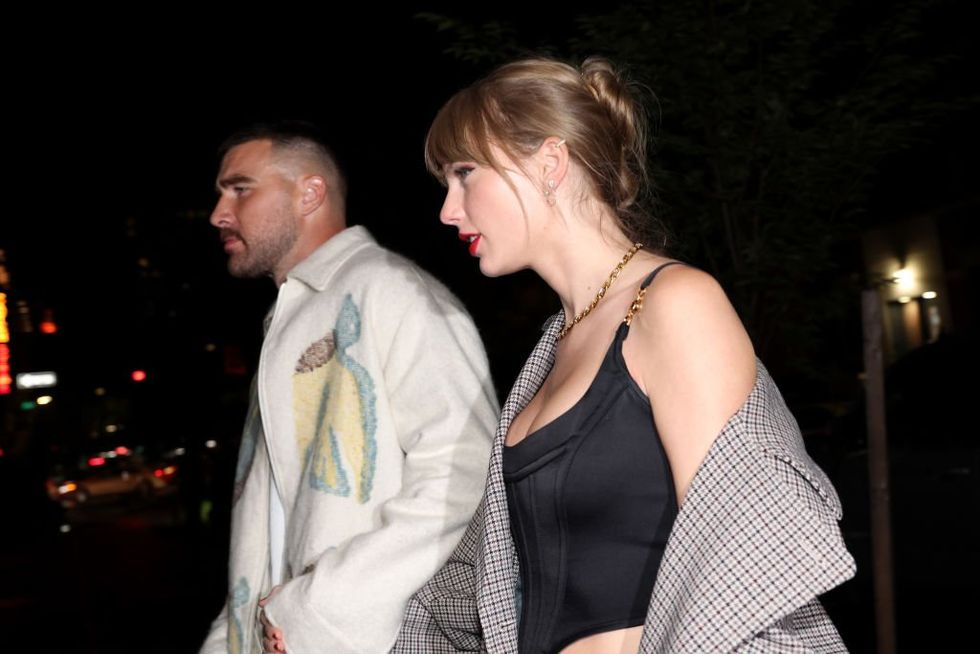
Kevin Winter/Getty Images

A growing trend of AI-created content is changing how we view celebrity.
When the first wave of mainstream AI panic descended on us in January 2021, right around when OpenAI announced its image generator, DALL-E, my first thought was: This is going to revolutionize fandom first, then satire.
Integrating AI in these spaces wouldn't only democratize content creation to some extent (not as much as you'd think, though using AI still has a barrier to entry!) but also potentially blur the lines between official and fan-made or amateur content.
If you could dream it or type it, you could see it.
Not everyone was going to like it — and indeed, not everyone accepts artificial intelligence in their fan spaces, whether it's because it's a betrayal of the authenticity of relationships or they feel like it's otherwise exploitative — but there was no containing it. This suspicion was almost immediately vindicated.
Websites like fanfiction.net and AO3 added "AI" tags for their stories; services like character.ai, which allow you to do an AI roleplay where you're communicating with your favorite fictional character or star, cropped up, and there was an explosion of AI-assisted fan art accounts on X, like the popular Neon Evangelion artist, @lucifel99.
The satire space, too, saw immediate adoption of these new AI tools. Deepfaked videos of Ron DeSantis were the most seamless part of his campaign.
It also reignited a familiar debate in fan spaces about the ethics of a tricky genre of fan work called real-person fiction.

Real-person fiction, or RPF, is exactly what it sounds like: fan fiction and fan art based on real-world celebrities. Sometimes, RPF is harmless.
Examples of this might include a portrait not based on an existing photo but that brings in elements from your imagination, a narration of a story the celebrity already told in which certain elements are fictional, or a comic strip depicting a made-up scenario. A fan of Sydney Sweeney might write about what he or she imagines Sweeney was like as a Universal Studios tour guide. For something to be categorized "real person fiction," it needs to be "transformative": that is, some part of it needs to be original fiction.
Other times, though, RPF is more ethically fraught, both for the fandom and the entertainer depicted in writing or art. Baseball player Andy Pettitte sent a cease-and-desist letter to the fan site FanDomination.net for publishing a 20-page homoerotic story about him. The story was self-consciously fictional — it wasn't purporting to be true — but it was still tantamount to defamation for Pettitte.
He's the only celebrity to date who's taken legal action over fanfic, and he might not have had a case had FanDomination not respected his wishes. But he's not the only person, both on the celebrity and fandom sides, to be alarmed by it.
One commenter put it like this in 1992:
When you create a universe, with characters and situations, you get to play god. The universe, the characters, the situations are all objects that a writer manipulates to her heart's content. When you write about real people, regardless of the situation, you have turned them into objects. Maybe this is neither good nor bad, but I feel that much of what past and current women's (and minorities) struggles are about, is a passion to NOT be objectified; to be viewed as individuals, as human beings, not things.
More simply put: real-person fiction treats real people as fiction. Some people in fandom spaces have strong ethical concerns about that. It's objectifying; it potentially invades their privacy; and it may even have the power to sway the way people view them.
But it's complicated, right? First of all, famous people are … well, famous. They're not ordinary people being speculated about by nosy, obsessive strangers. Selling your image to the public is part of the job description. Many of the legal protections are confined to people commercially benefiting from it.
Then there's the fact that historical fiction has always been a thing, and so has art that draws on real-life subjects. Is there a meaningful difference between great works of historical fiction from Homer or Shakespeare and RPF?
What about the "Tijuana bibles" circulated in the 1930s and '40s, featuring fictional erotic drawings and stories about Hollywood bombshells? The answers to this aren't as clear-cut as they might immediately seem.

AI and the internet add another dimension to all this. Social media-bolstered context collapse means even works that are wholly fiction may be interpreted as real. When the New Yorker short story "Cat Person" went viral, many people didn't even register it as fiction — they thought it was a confessional essay and started dogpiling the main character. It was bizarre to see it play out in real time.
What role do human errors like that play?
Imagine if, instead of written erotica, the story about Pettitte was an AI-generated image that was openly fake – maybe it had a watermark or a warning – but interpreted as real for the same reasons the short story "Cat Person" was interpreted as factual. Would Pettite have a case then?
Turns out he might — Taylor Swift did.
Last week, an X user created and distributed deepfake pornography of Taylor Swift. In response, a group of U.S. senators introduced legislation aimed at making it illegal to distribute non-consensual, sexually explicit images created using artificial intelligence. The trick about this case is that the user who distributed these images didn't claim they were real. This wasn't "revenge porn." It was somewhere in the gray area between satire and RPF.
But AI, with its ability to create hyper-realistic depictions of its subjects, pushes the boundaries of free speech.
If this new bill goes through … who else and what else will it impact?
In a world where celebrity sex tapes are common, will we even notice or care when they're created by computers?
- YouTube youtu.be
Katherine Dee
Contributing Editor, Return